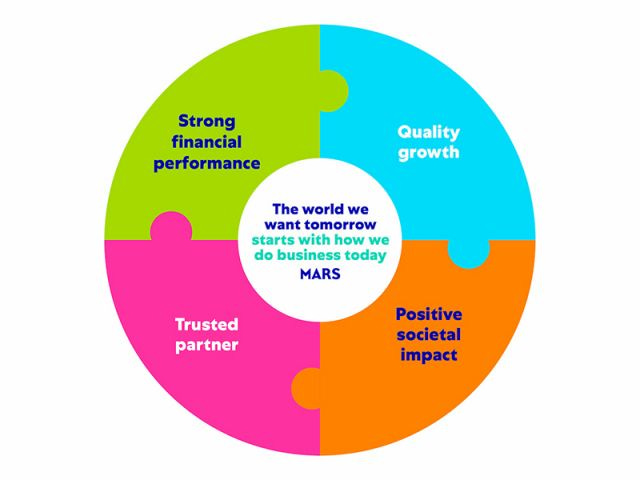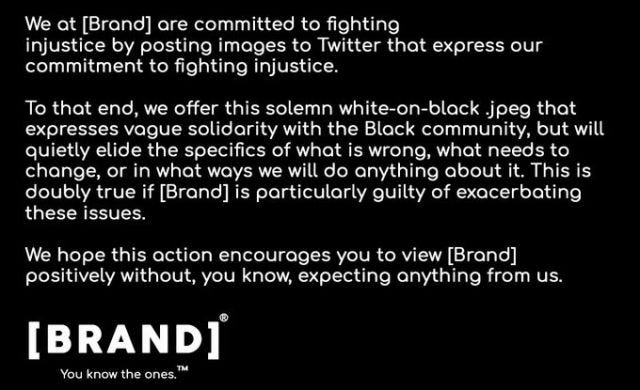#142: The Mars Compass, an example of great brand accountability, and the kind of customer I'm happy to lose.
Hi friends, if you're free, please join me Thursday evening as I host the 2020 Adobe Experience Maker Awards streamed live on LinkedIn. Click here to RSVP. This celebration of achievement in a time of feeling stalled will do us all some good.
(...OK so will the champagne!)
Presenting the awards as co-hosts are Maxwell Long, Senior Vice President, Adobe Customer Solutions and Marissa Dacay, Senior Director, Global Enterprise Marketing at Adobe.
And, just announced...
We’ll have two very special guests joining us for the event: Steve Kerr, Head Coach of the National Basketball Association’s Golden State Warriors, as well as a special performance from two-time GRAMMY® Award-winning recording artist, Academy Award-winning actress and best-selling author, Jennifer Hudson!

See you at 8pm ET on Thursday!
In this edition of The World's Best Newsletter #142, my focus remains on the current collision of social movements and marketing:
1. "The world we want tomorrow starts with how we do business today"
2. An example of brand accountability to systemic racism
3. What it's like to found while female - no sugar-coating!
4. "You're the kind of customer I'm happy to lose"
5. The case for stakeholder capitalism—even in the middle of a financial crisis
6. Taking a stand through marketing budget allocation
7. Quote of the week: "I shouldn't have to share this story..."
----------
1. "The world we want tomorrow starts with how we do business today"
Sitting at the center of the Mars Compass is this belief statement. The diagram is a concept used by consumer goods giant, Mars to guide the business to "deliver strong financial performance and quality growth, while acting as a trusted partner in society with a positive social impact."

Andy Pharoah, VP of Corporate Affairs and Sustainability is quoted in The Drum saying:
“When our brands do purposeful things, it comes from a solid and sound foundation. It's not cause-related marketing, a hit for the day or for the quarter, or for the year.”
The compass helped to make a decision about how to respond to the Black Lives Matter movement. In part:
Responding to allegations that the brand was itself perpetuating racist prejudices via rice brand Uncle Ben’s, Mars acknowledged that the Texan rice farmer mascot, first used in 1946, might not be fit for the 2020s.
Quoting Andy again:
"...we believe that fundamentally what needs to happen is acts, not ads.”
I recommend the Mars Compass as an example of how brands can set guidelines about navigating the values-driven marketplace. The company describes it as a "set of objectives as well as a philosophical approach." Having these in place - like values - help to illustrate the right path forward. But, critically, this is purported to be more than a pretty graphic to be used in PR. It is measured to ensure accountability.
Via The Drum article "Executive performance is measured against these criteria."
2. An example of brand accountability to systemic racism
The Black Lives Matter movement calls for the removal of systemic racism within our institutions. For brands this means the protests are demanding a hard look at the role both our individual companies, and our respective industries have played in perpetuating racial inequities.
One of the ways your response to BLM is authentic, not performative, is to embrace accountability.
A great example of this is Rent the Runway.
Like many brands, Jennifer Hyman, CEO and co-founder posted a response to the protests. Unlike so many that included a vague promise to "improve diversity" or stopped at a donation, Jennifer's statement included a list of immediate / long term actions. Here's where this moved from performative to real allyship:
It took responsibility and ownership by acknowledging that their industry - fashion - has “co-opted the style, inspiration, and ideas of Black culture without ensuring Black people are economically compensated for this... The fashion industry must do better – and we at Rent the Runway are responsible for being a part of this change."
It took a stand: “We believe that supporting Black business, Black designers, and Black talent is both in the fashion industry’s moral AND financial best interest.
It provided clear, direct, and measurable actions:
Allocating $1M for black designers "through our wholesale, platform and co-manufacturing initiatives, which includes providing design resources, data, mentorship and financial support to create collections for RTR. It is critically important to us that a significant portion of our $1M goes towards launching fashion brands from Black designers who have not had the investment capital to launch on their own."
Committed to 15% "of the fashion talent that we feature and support moving forward are from the Black community, inclusive of the models in our marketing, the ambassadors we use, and the styling talent, photographers, videographers and crews behind the camera." This was inspired by Aurora James’ #15PercentPledge - a push for retailers across the US to commit to buying 15% of their march from black-owned businesses. This campaign CTA is:
"We represent 15% of the population and we need to represent 15% of your shelf space."
The firm is also donating to organizations combatting racial injustice, looking to donate clothes to the Black community for job interviews to help with the disproportionate impact of COVID, and building a formal D&I competency within HR, including training/recruiting, etc.
A great example of ownership and accountability, proactive action, and clear, measurable goals. Imagine if every company's response was this individualized, honest look at their role in perpetuating systemic racism, instead of this:

h/t Chris Franklin
3. What it's like to found while female - no sugar-coating!
PlanGrid's Co-founder/CEO Tracy Young has a new blog post about being a female founder, and it is one of the boldest, least sugar-coated pieces I've ever read about the experience of women entrepreneurs.
I went into labor the same night of our first user conference. The weeks leading up to the conference, watching our whole company burn late night candles in preparation for our new product unveiling, I wondered how many male CEOs would skip their conference for the birth of their child? I assume most would. I kept reasoning with myself that if I wasn’t pregnant, there would be no question whether I’d be there or not, so I must be there.
Forcing myself to parade my 9-month pregnancy, deliver the keynote, support our team, and work the halls as the host, was my way of feeling like a superwoman, which was mostly about rubbing my own ego. I arrived home around 8pm that evening, and my water broke immediately. I would hear my son’s first cry 32-hours later.
4. "You're the kind of customer I'm happy to lose"
Amazon is far from perfect.
A month before its "together we stand in solidarity" response to BLM, it had fired a Black warehouse worker for protesting over coronavirus health concerns at its facility. The company also preempted a recent shareholder meeting by "sending TV stations a video news release that looks like a news story, claiming it is spending billions of dollars to keep workers safe, and many broadcasters ran all or parts of it without telling viewers where it actually came from." Read more in FastCo.
But there is one lesson we can learn from the PR efforts of the team around Jeff Bezos right now.
In response to an email from a racist customer, Bezos writes:
You're the kind of customer I'm happy to lose.
I brought up this example today on a panel event when an audience member asked "with BLM and the pandemic being politicized, how do brands avoid getting political?"
My response was an adage I bring out often these days:
The only thing you find in the middle of the road is roadkill.
We have to be willing to take a stand as businesses - not for a particular politician, but for the values that we uphold. This mindset of being willing to lose customers is a decision to align your organization with a particular audience segment, good marketing 101.
5. The case for stakeholder capitalism—even in the middle of a financial crisis
Rob Walker wrote an excellent plea for CEOs to "emerge from their bunkers" (ha), making the case "that thinking beyond the bottom line is precisely the right business strategy for right now."
“Think about your sphere of influence. How can we use that sphere of influence to dismantle inequality in the larger world?”
He quotes Harvard Business School professor Rebecca Henderson:
For years, we’ve been moving toward an increasingly “extractive” economic system — a sliver of people with money and a vast sea of those without. The pandemic seemed simply to boost that trend, further devastating the middle class, dividing the country into an elite that could work from home and order their groceries and other goods delivered, and a much larger class that was thrown out of work and scrambling to get jobs in distribution warehouses or delivery services.
According to Henderson, the research finds that while extractive economic regimes can in fact grow, they cannot sustain that growth — and they can’t offer social well-being beyond that elite. The result is either widespread demand for reform (or revolution), or an increasingly entrenched class at the top of the heap interested only in maintaining its own standard of living. “Who wants to live in that world?” she asks.
The alternative is to strive — for business itself to strive — to make a system more inclusive, less extractive. These issues aren’t a distraction business can ignore; they’re existential. “Business,” she says, “needs to care about civics.”
And this pithy quote:
The business leaders who build and expand will prevail over those who retreat and retrench.
6. Taking a stand through marketing budget allocation
For the month of July, a handful of the biggest brands in outdoor gear have suspended ads across Facebook and Instagram as part of a #StopHateForProfit accountability campaign.
It calls for Facebook to:
Provide more support to people who are targets of racism, antisemitism and hate
Stop generating ad revenue from misinformation and harmful content
Increase Safety in Private Groups on Facebook
Why?
“They allowed incitement to violence against protesters fighting for racial justice in America in the wake of George Floyd, Breonna Taylor, Tony McDade, Ahmaud Arbery, Rayshard Brooks and so many others.
They named Breitbart News a “trusted news source” and made The Daily Caller a “fact checker” despite both publications having records of working with known white nationalists.
They turned a blind eye to blatant voter suppression on their platform.
Could they protect and support Black users? Could they call out Holocaust denial as hate? Could they help get out the vote?
They absolutely could. But they are actively choosing not to do so.”
The campaign was coordinated by the Anti-Defamation League, the NAACP, Color of Change, Free Press and Sleeping Giants.
via TechCrunch
7. Quote of the week: "I shouldn't have to share this story..."
"I shouldn’t have to share this story in the year of our Lord, 2020 - but here we are. I’m an alum of Yale, Google, FB, in the WaPo Tech 202 Network, etc…and recently decided to leave @Pinterest, which just declared ‘solidarity with BLM.’ What a joke. 🙃"
The full thread from Ifeoma Ozoma goes on to illustrate the reality of working at the firm despite its "Black Lives Matter" social posts and CEO statement. Read more about this story in NPR's new article today.
Welcome to the age of sunlight and accountability.
😎
Best,
Katie
----
Katie Martell


